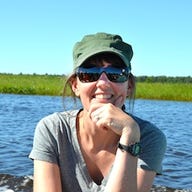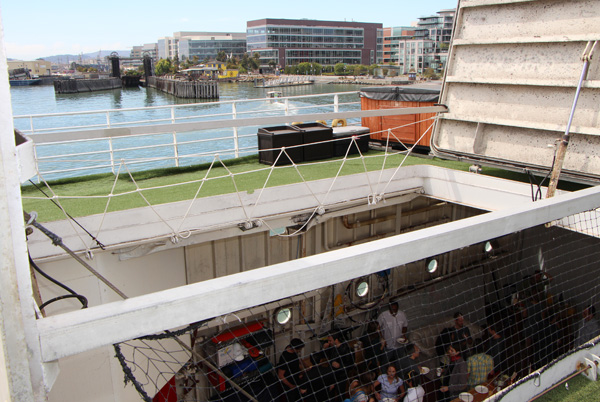In San Francisco, startups hatch ideas in a floating incubator

On a warm, sunny Sunday morning in August, some of the brightest minds in the Bay Area milled around a 38-year-old car ferry docked south of the San Francisco Giants' ball park. Eating muffins and drinking mimosas, they watched short presentations on topics ranging from artificial intelligence to techno-archeology to 3D gesture control.
This "Innovation Sampler," was part coming out party, part real estate open house for the Maritol (nicknamed The Icebreaker). The vessel is co-owned by Creon Levit, a senior research scientist at NASA's Ames Research Center, and a group of buddies-slash-angel investors-slash-entrepreneurs-slash-philanthropists. They purchased the boat in 2011 from architect Olle Lundberg, who brought the ship over from Iceland, where it formerly schlepped cargo, people and cars around the icy Norwegian Sea. Lundberg subsequently converted the Maritol into a very unusual houseboat. Initially, the new owners planned to use it as a live-work space, but as they learned, this would not jive with the rules and regulations of the San Francisco Port Authority,
"So we pivoted," Levit explains. "It's not a great space for people to live in, but it has a lot of beautiful spaces for meeting and working. It turns out to be one of the most desirable and interesting [working] spaces in San Francisco. It works well for people who want something a little different -- and people who want to bring their investors and customers to an interesting space. It's not your average incubator."

Matterport, which makes 3D models of physical spaces, is among the many startups that have toiled, collaborated and experimented on the Maritol. In fact, the company honed its technology in part by scanning and then 3D-mapping the ship's very intricate engine room. During the Innovation Sampler, Matterport demonstrated its product, allowing guests to don virtual-reality goggles to "walk through" the classrooms of a school. As I awaited my turn to step into the virtual space, I realized futurist, writer and Stanford professor Paul Saffo was finishing his visit. "I've tried a lot of those face-suckers," he says, referring to the virtual-reality mask, "But this is the best I've seen."
Back in real reality, the developers of a Kickstarter success story called OpenROV, an open-sourced underwater robot, used the Maritol and the waters surrounding it as a test bed. The startup has since gone on to use OpenROV to help scientists collect underwater images around Antarctica and in the South Pacific.
Not all of the products and services developed at the incubator are quite so edgy: some are just good business ideas. What We Order is an e-commerce software that catalogs supply orders made by employees and then makes reorders quick and easy for anyone in the company. It links directly into accounting systems through enterprise resource planning (ERP) software.
"We were one of the What We Order alpha testers," Creon says. "We constantly order stuff from Costco, Amazon, Granger, McMaster-Carr and places that sell ship supplies. We can click, click, approve and there is no screwing around with different vendors."
The August gathering was not just a way to show off the talent and network of innovators that utilize the Icebreaker, it was also an event meant to help the incubator find a new berth. That's because the Port of San Francisco has told Levit that the Maritol is not in compliance and therefore must leave the port, post haste.
"We're really grateful that we've been able to be there for two years, and we hope we can work it out, in order to remain for years to come," Levit says. He and his partners are meeting with city officials and searching for an alternative berth. "The best option is to berth the ship somewhere else in SF," he says.
The mayor's office is trying to develop an innovation corridor, with startup-friendly developments, and Levit and his partners say they fit that vision. But if he and his partners can't find a new home in San Francisco, they'll consider the East Bay or another West Coast harbor city.
The crew is also hoping the long roster of Maritol's friends and supporters might help them find a creative solution to their predicament. Those friends present at the Innovation Sampler included technology pioneers, such as Brad Templeton, who founded the first-ever dot-com company, Dan Kaminsky, an Internet security expert, and Brewster Kahle, who founded the Internet Archive.
"You can't have innovation if you don't have the free exchange of ideas –- and a place to do that in," says Brendan Curran, an engineer at San Francisco-based healthcare software startup Blueprint Health in attendance at the recent event. "If places like this don't exist in San Francisco, then innovation can't exist in San Francisco."
(Photos by Tyson Macdonald (thumbnail) and Brad Kohlenberg)
This post was originally published on Smartplanet.com